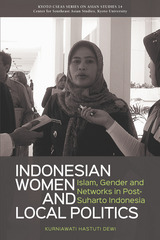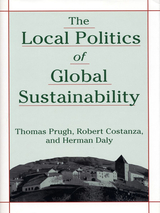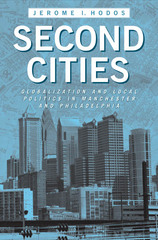
What ties bound region to center in the making of the modern Japanese state? What forces shaped these bonds? How did the local–center relationship change over time? What is its current legacy?
Focusing on the marginal region of Toyama, on the Sea of Japan, the author explores the interplay of central and regional authorities, local and national perceptions of rights, and the emerging political practices in Toyama and Tokyo that became part of the new political culture that took shape in Japan following the Meiji Restoration. Michael Lewis argues that in response to the demands of the centralizing state, local elites and leaders in Toyama developed a repertoire of supple responses that varied with the political or economic issue at stake.


The most difficult questions of sustainability are not about technology; they are about values. Answers to such questions cannot be found by asking the "experts," but can only be resolved in the political arena. In The Local Politics of Global Sustainability, author Thomas Prugh, with Robert Costanza and Herman Daly, two ofthe leading thinkers in the field of ecological economics, explore the kind of politics that can help enable us to achieve a sustainable world of our choice, rather than one imposed by external forces.
The authors begin by considering the biophysical and economic dimensions of the environmental crisis, and tracing the crisis in political discourse and our public lives to its roots. They then offer an in-depth examination of the elements of a re-energized political system that could lead to the development of more sustainable communities. Based on a type of self-governance that political scientist Benjamin Barber calls "strong democracy," the politics is one of engagement rather than consignment, empowering citizens by directly involving them in community decisionmaking. After describing how it should work, the authors provide examples of communities that are experimenting with various features of strong democratic systems.
The Local Politics of Global Sustainability explains in engaging, accessible prose the crucial biophysical, economic, and social issues involved with achieving sustainability. It offers a readable exploration of the political implications of ecological economics and will be an essential work for anyone involved in that field, as well as for students and scholars in environmental politics and policy, and anyone concerned with the theory and practical applications of the concept of sustainable development.

If there is a "culture war" taking place in the United States, one of the most interesting, if under-the-radar, battlegrounds is in local school board elections. Rarely does the pitch of this battle reach national attention, as it did in Kansas when the state school board—led by several outspoken conservative Christians—voted to delete evolution from the state's science curriculum and its standardized tests in August 1999. That action rattled not only the educational and scientific communities, but concerned citizens around the nation as well.
While the movement of the Christian Right into national and state politics has been well documented, this is the first book to examine their impact on local school board politics. While the Kansas decision was short-lived, during the past decade in school districts around the country, conservative Christian majorities have voted to place limits on sex education, to restrict library books, to remove references to gays and lesbians in the classroom, and to promote American culture as superior to other cultures.
School Board Battles studies the motivation, strategies, and electoral success of Christian Right school board candidates. Based on interviews, and using an extensive national survey of candidates as well as case studies of two school districts in which conservative Christians ran and served on local boards, Melissa M. Deckman gives us a surprisingly complex picture of these candidates. She reveals weaker ties to national Christian Right organizations—and more similarities between these conservative candidates and their more secular counterparts than might be expected.
Deckman examines important questions: Why do conservative Christians run for school boards? How much influence has the Christian Right actually had on school boards? How do conservative Christians govern? School Board Battles is an in-depth and in-the-trenches look at an important encounter in the "culture war"—one that may well determine the future of our nation's youth.

READERS
Browse our collection.
PUBLISHERS
See BiblioVault's publisher services.
STUDENT SERVICES
Files for college accessibility offices.
UChicago Accessibility Resources
home | accessibility | search | about | contact us
BiblioVault ® 2001 - 2024
The University of Chicago Press









